#time to get into one of the longest sections of this essay hoo boy
Explore tagged Tumblr posts
Text
10 Danny Phantom Episodes with Good Concepts that Sorely Disappointed Me: “The Ultimate Enemy” (Part 2)
Alright, here I am, everyone—part two of my critical analysis on “The Ultimate Enemy”, and how its faulty writing let down a good episode idea. For those stumbling across this for the first time, I am in the process of composing an analytical list of ten Danny Phantom episodes whose concepts I liked, but didn’t like the execution of. “The Ultimate Enemy” is the first on this list. Due to the size of my complaints with the episode, I’ve split my arguments into multiple categories across multiple posts; I highly suggest you start from the beginning with part 1 here before moving onto this post. It covered the main introduction, and Category A of my problems with the episode: the plot points that were primarily irrelevant to Dan’s character.
For those of you continuing from the first part, I apologise for this part being overdue. I proposed I would edit and upload part two roughly a day after part one, but those days dragged on due to constant re-editing and problems with my mental health. Parts three and four shall probably take longer than a few days to edit and upload as well, as I discovered arguments in the essay that needed massive overhauls before posting. I can guarantee they’re coming eventually (the whole thing essay is fully written, point-wise); I need to rework and trim the fat off some paragraphs.
Without further ado, this post will take a look at everything I’ve chucked into Category B—my issues with Dan’s characterisation, and how what the episode showed us about who deserved responsibility for Dan contradicted what it told us about how Dan was created.
(Also, because of my saltiness seeping in when I was writing, my captions for the images got a little too snarky for an analytical essay, but I am too tired of re-editing this section to remove them. Hopefully, they’ll serve as humour; if not, I apologise.)
1. The episode incorrectly portrayed Danny as the only one responsible for Dan’s existence, and for the wrong reasons (the wrong events in the timeline). Upon scrutiny of the actual sequence of events that led to Dan’s creation, the direct responsibility for Dan’s birth was either an even split between Danny and Vlad, or slightly more Vlad’s fault (depending upon the interpretation of the event that did actually cause Dan).
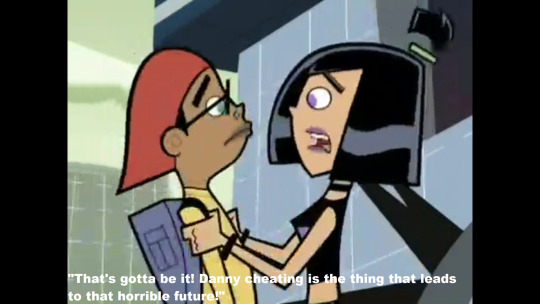
(Spoiler alert: No. No, it was not.)
The episode initially chose to establish Danny cheating on the CAT as the cause for Dan’s existence. While this was partially, indirectly true (since it set up the chain of events that led to Dan’s creation), it was not the event that directly caused Dan—yet, the episode treated it as a highly important tipping point, close to the point of no return that led to Dan. Looking at Dan’s backstory from the information Future Vlad gave (as dubious as it was), and working backwards, it was clear that Danny cheating on the test was not the vital “point of no return” by any means. Neither was the explosion at the Nasty Burger, for that matter (which the episode treated as the point of no return after Dan cheated on the CAT in Danny’s place, which required the episode to postpone the narrative stakes of preventing Dan’s creation to the Nasty Burger fight).
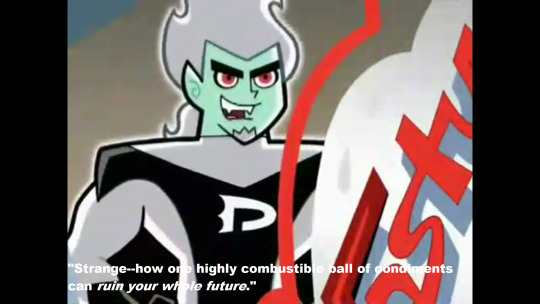
(Well...not exactly--it didn’t ruin Dan’s future, but it did ruin Danny’s. There’s a distinction.)
Kick-starting the entire chain of events that set up the eventual moment of Dan’s birth was not synonymous with directly creating Dan, and blaming the causality for Dan’s existence on Danny cheating (the leap of logic that “Danny became evil in the future because he cheated on a test”) or even his loved ones dying at the Nasty Burger was incorrect.
To demonstrate the argument, I’ll shift to an in-universe hypothetical:
Imagine yourself in Clockwork’s shoes: an “evil future version of Danny” has been created, and you have to prevent Dan’s existence by searching through the events that led his creation to find as many openings between key events as possible, in order to change one and subsequently avert all the events (including Dan’s creation) that followed.
To lay it out in full, the chain (separating the events based on intervention windows) was as follows: (1) Danny cheated on the CAT -> (2) Mr. Lancer met with Danny’s parents at the Nasty Burger to discuss it -> (3) they (including Sam, Tucker and Jazz) died in the Nasty Burger explosion -> (4) a grief-stricken Danny went to Vlad in Wisconsin -> (5) Danny requested that Vlad numb his emotional pain -> (6) Vlad split Danny’s ghost half from his human half—only for the ghost half to immediately pull out Vlad’s own and fuse with it into Dan.
Dan’s existence being the result of (what was essentially) a disastrous line of falling dominoes made his origin more sinister, but also highly easy to prevent (at least, without taking into account the mess caused by the story’s poorly thought out use of time travel, which I’ll explain later in section C). After all, the more complex a system (the more elements necessary for a system to successfully operate and achieve a desired result), the more weak spots it has—as meddling with one part can affect all the other parts and lead the entire operation to fail.
Utilising any of the intervention room between the events in “The Ultimate Enemy’s” alternate timeline would prevent Dan’s entire existence. The only event, therefore, that could be labelled the direct cause of Dan’s existence was the event that immediately resulted in Dan’s birth, and the most dire pivotal point—which rendered Dan inevitable—was the event directly before that. The event of Dan’s creation itself (or the cause of Dan) was event number six—the removal of both Danny and Vlad’s ghost halves using the Ghost Gauntlets, and their subsequent fusion with each other. The event which led to this—event number five, which was Danny’s request for Vlad to remove his emotional pain—was the direct catalyst for the procedure, and therefore the important “point of no return” leading to Dan that the episode tried to make Danny cheating on the CAT (and once that was over, the act of losing his loved ones) out to be. (Technically speaking, it was one of possibly two options for the event upon which Dan’s existence truly hinged—number four was also a likely candidate).
Danny cheating on the CAT was not the cause of Dan (even if it set the eventual stage), because there were numerous ways to interfere after the incident of Danny cheating the CATs and still prevent Dan from existing. Clockwork could’ve interfered between events one and two, by changing Mr. Lancer’s parent-teacher meeting location to anywhere safer than the Nasty Burger, so no one died (he could’ve utilised Jazz to sway Mr. Lancer, perhaps—it’s safe to assume Clockwork was aware of her knowledge on Danny’s secret, and she was the one Mr. Lancer approached about Danny cheating). He could’ve interfered between events three and four—had Danny’s loved ones still die at the Nasty Burger but convinced Danny himself not to go to Vlad. He could’ve popped in between events four and five and convinced Danny, right after moving in with Vlad, to not ask for a way to numb his emotional pain. However, Vlad proved to be a dubious source in the flashback of Dan’s origin story, and was typically too much of a wild card, so preventing Danny from moving in with Vlad at all is likely the safest option.
Ergo, either event four or five should’ve been treated as the important point that led to Dan’s existence. On top of that, Vlad’s role in event six proved he was partially responsible for Dan’s creation, but the rest of the episode outside of the flashback neglected this fact in favour of pushing the “Dan was all Danny’s fault” message.

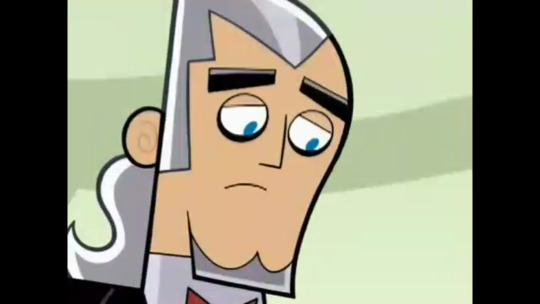
(Begin Vlad’s unreliable narratorhood in 3...2...1...)
However, Future Vlad behaved like an unreliable narrator of the “Dan’s creation” flashback, so his explanation of events shouldn’t be taken at face value. Assuming the basic outline of events was trustworthy, however, the episode indicated to us that Vlad was roughly equally as responsible for Dan’s creation as Danny. He conceded to Danny’s desire to escape his emotions and responded with the halfa-splitting operation that caused Dan’s fusion.
He stretched the reality of the event to Present Danny when he exaggerated the delivery of some (if not most) of his narration lines in the flashback. It was most blatantly clear in the line where he inflated his importance to Danny after the tragedy, “With nowhere else to go, you came to me—the only person left on the planet who could possibly hope to understand your situation.” He verbally emphasised the words ‘me’ and ‘possibly’, and the phrases “the only person left on the planet” and “could possibly understand” were hyperbole in their own right. Another was the line, “No more painful human emotions to drag you down,” where he spoke the italicised words with overt disdain for Danny’s emotions. It could be interpreted simply as Vlad’s typical habit of speaking in a dramatised manner, rather than trying to make himself look good to Danny by stretching the truth. However, even if choosing to interpret Vlad’s delivery as the latter, he still skewed his recount through vagueness and omission in the literal content of his narration (when linked to the visuals that ran alongside his lines).
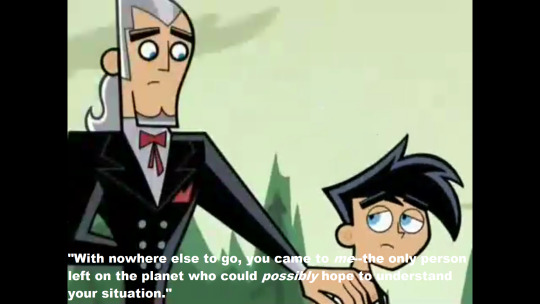
According to Future Vlad, Danny asked for his emotional pain to be taken away; and Vlad removed his ghost half to “[honour] [his] wishes,” while the shot changed from Vlad’s sympathetic face at the grieving Danny to the procedure with the Ghost Gauntlets. Future Vlad never explicitly stated whether it was Danny or him that decided removing Danny’s ghost half was the course of action to take, Vlad only explained that Danny “wanted to make the hurt go away”, and then the shot cut to Vlad removing Danny’s ghost half with the only explanation that he was acting in accordance with that wish.
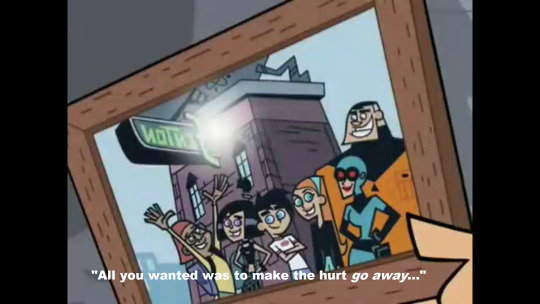

On top of not explicitly saying whose idea it was, (though, with Vlad’s knowledge and experience with halfa research far exceeding Danny’s, it was almost certainly his) the episode did not explain how his logic leapt from “remove Danny’s emotional pain” to “remove Danny’s ghost half”, which was an insensible method to solve Danny’s problems.

The “no more human emotions” line indicated that his intention behind the procedure was to remove Danny’s human emotions, yet he knew that the procedure entailed removing Danny’s ghost half.
It made no sense, in universe, for Vlad to competently assume that removing Danny’s ghost half from him would work to remove an emotionality rooted in his human half (the episode overall, by the way Dan referred to human emotions and sentimentalities as a “humanity” he gave up, implied that it intended to frame the emotional attachment to Danny’s loved ones as part of his human half). If it could be chalked up to an external fault, like the lack of clear research into the procedure’s outcome, and not Vlad’s failure to realise the logical inconsistency, the episode needed to give evidence of this. Without that information, the only feasible assumptions were either that he wasn’t making any sense in-universe, he was supposed to be sensible but the episode’s writing didn’t make sense, or he had an ulterior motive for convincing Danny into going through with the operation. Either way, it was yet another part of Dan’s creation that Vlad was responsible for, not Danny, and the episode’s message was illogical to contradict this.
Through potentially exaggerating his sympathy for the alternate Danny in his verbal intonation, and blatantly failing to mention the details of why he chose removing Danny’s ghost half to fix a “human” problem, Vlad told his version of Dan’s birth in a way that would minimise his moral fault in the incident to Present Danny. His only logically feasible motivation for this was to hide further moral accountability for Dan’s creation than what we already saw in the face-value version of the flashback.
To summarise this entire sub-category of arguments, the episode was wrong to pin Dan’s existence on Danny cheating on the CAT (and even on losing his family, as the second half of the episode changed gears to), rather than his desire to remove/escape his emotions (even if the deaths resulted in the pain that he wanted to remove in the first place, which I shall explain later in Section D). It was also mistaken to portray Danny as the primary cause of Dan, rather than acknowledge that Vlad was equally (if not more), responsible than him.
Additionally, the fact that Vlad, as an in-universe character, tried to minimise his moral role/accountability in the physical causality of Dan’s creation by skirting around the truth in his retelling was something that the episode itself should’ve acknowledged or called out, through more reliable information from a third-person or other characters’ perspectives such as Danny, Dan’s or Clockwork’s—but it didn’t.
2. On top of physical responsibility for Dan, the episode was wrong to pin Danny with the moral blame and identity of Dan. It treated the two of them as essentially the same person, and portrayed Dan as just a Danny from the future who turned evil because of a combination of Danny’s potential evilness (potential to do “selfish/evil” things) and tragic circumstances. Considering Dan’s backstory, it made no sense for Danny to be the sole owner of either Dan’s immorality or identity/personhood.
Dan’s backstory told us that physically Danny wasn’t solely responsible for his creation, but the rest of the narrative still deeply connected Dan to Danny alone by treating Dan as what would happen if Danny let his pre-existing moral flaws take over him—that Dan’s villainy (or evil nature) came from Danny.
Clockwork referred to Danny Phantom as “grow[ing] up into the most evil ghost on the planet” in the cold open (which, given that Dan was a product of a fusion, was blatantly false.)

“The Ultimate Enemy” attempted to build up the idea that Danny had the potential for evil, and that Dan was him realising his own evil, in the scene where the trio entered Clockwork’s lair. As they watched Dan’s carnage through the observation window, Danny excitedly admired Dan’s Ghostly Wail, completely oblivious to the seriousness of the situation, and Sam called him out for not reading the room.
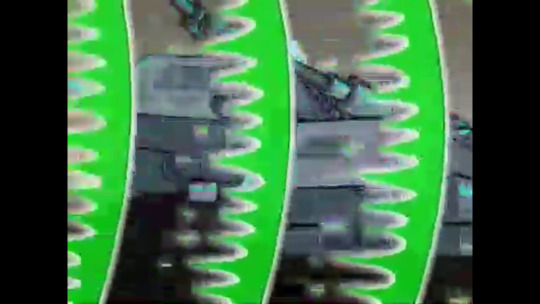
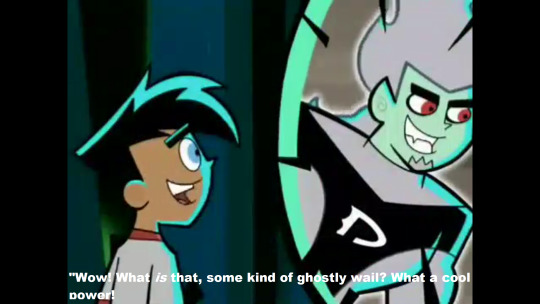

(Though, Sam’s condemnation of Dan’s villainy was extremely underwhelming—calling a world-destroyer and (presumable) mass murderer just “kind of a jerk” in a snarky tone did not do the severity of Dan’s actions any justice.)
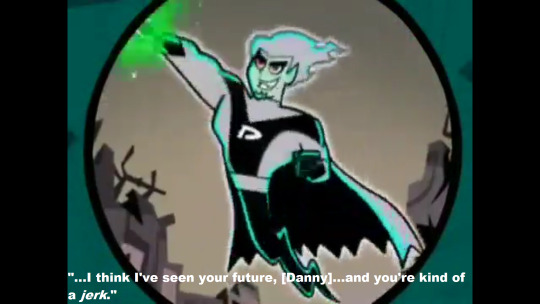
When they confronted Clockwork, Danny scoffed at him to find just “one” evil thing he’d done. The shot then immediately focussed onto “examples” of Danny’s “evil” in the time window—first, Jazz finding out Danny was going to cheat the CATs (which, as established in point one, was not as morally significant as the episode tried to portray it—that shall be further elaborated later in Section D). After Tucker sassed at Clockwork, “[I] bet you can’t find two!”, the time window changed to Dan standing atop his destruction in the alternate future, and Clockwork replied, “How about two thousand?��—implying that Clockwork was referring to what Dan did in the future as at least part of the (supposedly numerous) evil things Danny did (or would do). This made no sense unless the episode was implying that Dan’s immorality was Danny’s own. However, this implication was incorrect, leaving Clockwork to state that he had seen countless instances of Danny Fenton/Phantom being evil with no valid examples to show for it whatsoever.
Dan’s atrocities had no weight as examples of Danny’s morality flaws due to the fact that Dan’s evil was not primarily Danny’s to begin with, creating a feedback loop of invalidation; evidence for the argument was invalid because its own validity was dependent on the validity of the very argument it was supposed to be supporting.

(Danny, despite the episode’s reluctance to be fair to him with its accusations of his “potential villainy”, was actually justified in asking this of Clockwork. You know there’s something wrong with your story when your self-centred, short-sighted teenage protagonist is righter than your supposedly all-knowing Master of Time in this situation.)

(Cheating on a test is not evil, Clockwork, try again.)

(Nope, sorry, Dan’s evil is not Danny’s “evil”; your argument is invalid.)
(I typically put the “improvements/fixes” part at the end of each point, but for the sake of its direct relevance to the aforementioned example, I’ll put it here to avoid structural confusion in the essay:
“The Ultimate Enemy”, for some reason decided that its reason/foreshadowing of Danny’s potential for evil had to be self-contained; ironically, almost all (sans a small few) of the episode’s examples of Danny’s moral flaws weren’t “evil” at all, and they would’ve been far better off using actual events of Danny showing potentially villainous traits from previous episodes. Danny may have been justified in asking Clockwork to name one evil thing he’d done, because that accusation had no basis at that point, but Clockwork’s response should’ve been to show previous instances in the series where Danny took advantage of others with his powers.
For example, imagine if in the episode, when Danny demanded, “Name one evil thing I’ve done!”, Clockwork’s time window had switched to moments like the end of “Maternal Instincts”, where he manipulated Vlad into lowering his guard, or his acts of overshadowing Dash for petty revenge in “Splitting Images” or “Reign Storm”? Not only were they more legitimate examples of morally corrupt characteristics—tricking people for his own gain/victory and abusing his powers to the detriment of others—it would’ve given such a significant episode in the series more continuity with the previous ones. In fact, the examples in two of those previous episodes resulted in Vlad pointing out that Danny was becoming more like him, as a way to use Vlad’s relationship as Danny’s nemesis/character foil for the sake of tension. “The Ultimate Enemy” could’ve used those examples in its own narrative to turn Dan into a proper payoff of this long-term build-up of Vlad’s whole “We’re not so different, you and I” thing going on with Danny.
Also, it would add to the thematic irony of Dan being a fusion of Danny and Vlad’s ghost halves, if that aspect of his backstory was not altered in a rewrite of TUE.)
Vlad owned Dan’s evil nature equally as much as (if not more than) Danny because Dan was also half-Vlad. However, the episode neglected to acknowledge this outside of a few seconds on Dan’s birth in the flashback. While explaining the scene of the two ghost halves fusing into Dan, Future Vlad’s most honest lines of narration (because they straightforwardly confessed he was morally accountable for Dan to Danny, and thus had no motivation to be a lie) explained that, “My [ghost half’s] evil side overwhelmed you”. This implied that the reason Dan turned out evil in the first place was that Vlad’s evil took over Danny’s mind during the fusion.
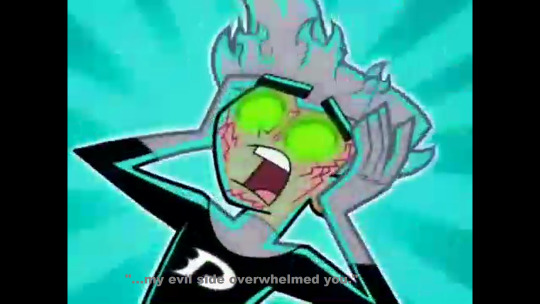
Given that we trust Vlad’s line, Vlad (or Plasmius, as Vlad’s ghost half) deserved most of the accountability for Dan’s lust for destruction and lack of a moral compass, not Danny. So, calling Dan “Danny’s evil future self” was only accurate in the literal sense of “this is what remained of Danny’s mind/existence in the future—his ghost half—even though it’s only a part of a larger fusion with another ghost, and this fusion is evil”. Dan was not a warning that “Danny was going to turn evil”, because Danny was not the primary source of Dan’s villainy.
In regards to overall personal identity, rather than just morality, Dan was also not “Danny’s evil future self” on account of the fact that he was not “Danny’s future self”, period. He shouldn’t have been an “older Danny” (or essentially the same person as Danny but older and evil), according to his backstory’s statement that he was half-Phantom, half-Plasmius. Yet, for some asinine reason, Dan only identified himself personally as “Danny” for the duration of the episode (without mention of Vlad).
After travelling to the past under Danny’s guise, Dan referred to Danny’s bedroom and face in the mirror as his own.
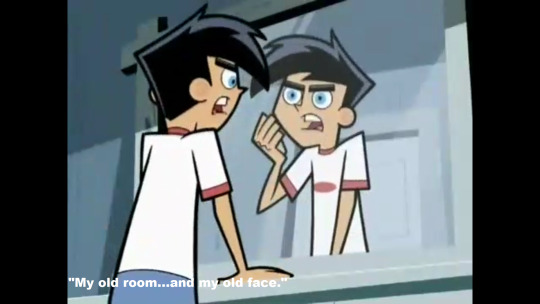
(Whoops--another image where I goofed the subtitles, this time in formatting...and MS Paint’s lack of layers makes redoing it an unnecessary pain. Sorry about that.)
When he met Sam and Tucker in the future, he explained his cold response to seeing them again as a result of “[surrendering his] human half a long time ago”. His singular human half. Not plural…because even Dan himself wanted to pretend that he wasn’t half Vlad, for some reason.
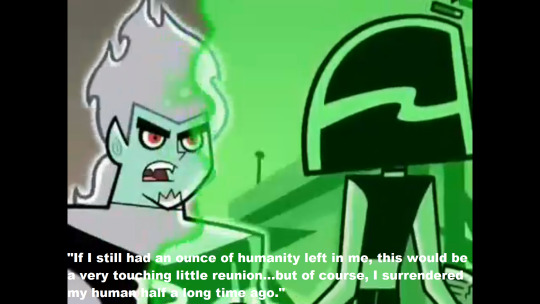
Perhaps it could be chalked up to people behaving differently in different social contexts; in that case, it was understandable that—even if he was part-Vlad—his Danny-side and memories influenced him the most in front of Danny’s friends…but that alone didn’t justify him stating that he only had one human half as a fact. The only other option that made in-universe sense was that it was a deceit/falsehood on Dan’s part, and therefore knowingly untrue. Perhaps Dan didn’t want to admit that he had more than one human half to Sam and Tucker—because he was not obliged to divulge that information to them—or that he preferred to mentally distance himself from Vlad’s human half because the latter was still alive, and separate from Dan. However, it was still untrue to link Dan and Danny together as people, but not Vlad, with the idea of only owning Danny’s human half.
The assumption that Dan was a future, evil Danny in person (and not also part-Vlad in person, or a new person from either of them entirely) implied that the fusion resulted in Plasmius’s mind giving his evil to Danny’s and then disappearing into the aether. It implied that a fusion of two people resulted in a powered-up being that was solely one of them psychologically, in order to purport that Danny (or, at least Phantom as his ghost half) was still Danny in sense of self for the last ten years in the alternate future. This contradicted the more logically valid implication that Plasmius’s mind or identity still existed as a component inside Dan, and Dan was at least both Danny and Vlad mentally.
Vlad explained in the flashback, “[Vlad’s] evil ghost half mixed with [Danny’s].” The general interpretation of “mixing” implied that the two ghost halves merged together into a new being and their traits and minds blended together. His identity should, theoretically, be either a half-and-half joining of the two halfas, or a whole new person with Vlad and Danny’s ghost halves as mere fusion ingredients. Ten years of existence and experience after the initial fusion would also, theoretically, give Dan enough time to develop this new mixed mind into his own individual sense of self beyond who/what either of Danny or Vlad were as people (prior to the ghost half fusion). In that case, Dan was not Danny’s “future self” in identity, and had little reason to identify Danny’s face, room and family as “his old [life]” (or, at least his only one).
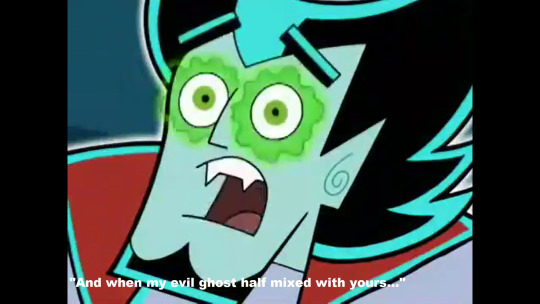
The next most obvious theory (about Dan’s psychological makeup as a fusion) is that one half was more dominant than the other during the fusion, leading to Dan to become primarily just one of them in identity. That dominant one had to have been Danny, based on how Dan identified himself in the episode, but that wouldn’t make sense. Phantom taking full control of the fusion and assimilating Plasmius into himself required that a grief-stricken fourteen year old was somehow capable of winning against a more experienced forty-something in a battle of minds, thoroughly enough to the point of absorbing the latter. Considering that Phantom was mentally weak enough to be the one “overwhelmed” by Plasmius’s evil (a single facet of Plasmius’s larger mind) almost immediately, that hypothesis seems unlikely. The notion of Phantom overwhelming Plasmius in the fusion to gain dominance, and Plasmius being the one to overwhelm him to turn him evil, contradict each other. Ergo, Dan being a mix of both Phantom and Plasmius was the most likely (and sensible) outcome of the fusion.
In that case, the episode was thoughtless and inaccurate to treat Dan as “Danny’s future self who became a villain”. Dan was not inherently linked to Danny in either the majority of his morality or his identity, due to the part Vlad played in Dan’s creation, and his mental component in Dan’s fusion.
2.5.A notable counterpoint, for the sake of not one-sidedly flipping all of the fault for Dan onto Vlad:
To be fair—as the idea of solely blaming Vlad would also be inaccurate to what Dan’s origin story showed—I should acknowledge a piece of evidence explicitly indicating that Danny still contributed some of his own darkness to Dan’s villainy, albeit less than Vlad. Once separated from his human half, Phantom ripped out and fused with Vlad’s ghost half of his own volition, all with a malicious grin on his face.

However, there was no clear motivation or reason for the separated Phantom to fuse with Plasmius (the physical cause of Dan that Danny/Phantom could be blamed for) —in fact, it made no sense for there to be any premeditated intention for Phantom to fuse with him, since he couldn’t have known that fusion with another halfa’s isolated ghost half was even possible at that point; it was an untried, never-seen-before method, hardly likely to mentally occur to Danny in the first place. Phantom resorted to attacking Vlad, stealing the Ghost Gauntlets and pulling out Plasmius for some unknown reason, but ghost-half fusion could not have sensibly been it. The Gauntlet attack simply demonstrated that Phantom took ill-willed pleasure from the act of hurting or depowering Vlad. After removing Vlad’s ghost half, fusing with it was the second step. Danny could be held responsible for his ghost half explicitly harbouring malice/potential evil in the attack (and his ghost half’s response to being removed was part of Danny’s responsibility in Dan’s creation), but that wouldn’t explain the crucial next step of the fusion itself.
This is where my ideas for potential improvements for the story of “The Ultimate Enemy” come in, as the exact extent of Danny’s contribution to Dan (in physical responsibility and mentality) wasn’t entirely clear—outside of this explicit evidence of Phantom’s facial expression. This uncertainty leaves the room for a do-over of the narrative to ask a lot of questions about how physically and morally accountable for Dan’s birth and evilness Danny actually was.
We could assume implicit evidence that Danny had some sort of inner darkness which contributed to Dan, even if only the minority, from the possibility that his grief at the loss of his loved ones (as well at helplessness at not being able to do anything to save them, and low evaluation of his own worth as a person) led to buried malice, anger and a desire for power to compensate.
Based on how splitting halfas apart worked in “Identity Crisis”, it made sense that Phantom had a sense of hostility and motivation to hurt Vlad once separated from Danny in “The Ultimate Enemy”. When Danny was split in half the first time, the halves took on the mental characteristics of the whole Danny’s momentary intents and desires. When Danny wanted his ghost half to do all the hero work so his human half could have the time to have fun, his ghost half took on an exaggerated hero personality and his human half an irresponsible teenager personality. Assuming this logic consistently determines the split halves’ personalities each time, and the fact that Danny’s desires in the alternate future revolved around escaping his emotional pain, it was logical that one of the split halves inherited a condensed majority of Danny’s pain (in this case, the ghost half), while the other half (the human one) was innocently blind to most of Danny’s grief and self-hatred—and that the suffering half acted out aggressively or malevolently as a result.
However, since we could logically assume that fusing with Plasmius was not the initial reason Phantom removed him from Vlad (and we assume the fusion was a spur-of-the-moment decision that occurred to him afterwards), why did he remove Plasmius in the first place? Was he intending to spite Vlad after all the grief he caused Danny in their rivalry? Was it a sense of inferiority telling him to tear Vlad down from his superior position? Was it to avoid letting Vlad stay a possible physical threat to Danny? There is such a large gap here, one could brainstorm countless possible motivations.
Furthermore, if that only covered his motivation to remove Plasmius, then what made him decide to fuse with him? Was he attempting to possess Plasmius as one ghost half trying to possess another for some reason? Was it internal panic? Was it a hunger for power pushing him to seize the opportunity that opened up? Why didn’t/couldn’t Plasmius fight Phantom off in the fusion scene?
These questions could be explored if the story of “The Ultimate Enemy” was redone. Present Danny, the Danny whose point of view we saw the episode from (rather than the Alternate Danny) hadn’t experienced the Dan future himself, so he didn’t know what was going through his alternate self’s head (human or ghost) during Dan’s creation. How much of it was his fault? How much of it wasn’t? How did he fill in the holes in the story Future Vlad told to him based on his own insecurities, and what did he blame himself for?
For that matter, why not get present Vlad wrapped up in it too? Have him take responsibility for what is HIS. If not, the episode should’ve at least acknowledged that Dan was not entirely “Danny’s evil”, and made it clear that he was cleaning up both his and Vlad’s collective mess by himself. If the message of the evil future self being Danny corrupted to the side of evil was so necessary for the episode, then simply remove the fusion plot entirely from Dan’s origin and have Danny become a villain by his own moral corruption. It weakened the impact of the future-self villain being a warning of “what the hero should avoid becoming” by having the main character only become evil by fusing with an already malevolent character.
3. The Observants’ conclusion that they had to kill Danny to save the world from Dan didn’t make sense, due to Vlad being primarily responsible for Dan’s evilness—but the episode, instead of acknowledging this inanity, actually reinforced the opposite.
Having now established that Vlad was half (if not more) at fault for Dan’s evil than Danny, the plot to kill Danny in the episode lost any of the ground it had to stand on.

(Nope...no, he didn’t have to.)
It was illogical for the Observants to assume killing Danny was the best way to stop Dan from existing when killing Vlad would equally achieve this (not to mention that either of these options were overkill, in the presence of the intervention methods mentioned in Section A). Without Vlad, Dan could not exist either. Eliminating Vlad would stop his continuous crimes against both worlds, and let Danny live to continue doing the good he’d done. After the events of “Reign Storm”, a large part of the Ghost Zone knew that Danny had saving Amity Park, and the entire Ghost Zone, under his belt—if an entire wasteland civilisation like the Far Frozen came to worship Danny for his victory against Pariah Dark (as shown in season three’s “Infinite Realms”).
(For that matter, where were the Observants hounding Clockwork to get on Vlad’s troublesome ass when he tried to steal the Crown of Fire and the Ring of Rage in “Reign Storm”, if Pariah Dark was so dangerous?)
If they were being somewhat rational, it was possible that they chose Danny as Vlad’s less powerful counterpart, and an easier target—even though they delegated the task off to Clockwork because intervention wasn’t their job, and they clearly acknowledged Clockwork’s power and competence to some degree. The Observants openly referred to Clockwork as the master of time while shirking their responsibility for fixing the future onto him, so whether or not killing Vlad would be too difficult for themselves would be irrelevant, since they made it Clockwork’s problem and became backseat commentators. Though, Clockwork would’ve probably foreseen Vlad’s importance in Danny’s emotional growth as his nemesis and also kept him alive anyway—but from a purely logical standpoint, it made little sense to execute Danny over Vlad, if they ever needed to kill anyone at all.
To be honest, the episode could’ve used the invalidity of the Observants’ plan to paint their incompetence more, expanding on Clockwork’s disdain for them and how he told the audience they “just observe”. However, to do that, the episode itself would’ve had to actually portray the Observants’ plan (not just the Observants themselves, but their actual plan to kill Danny itself) as nonsensical. The episode never did, however, as it had Clockwork—the character portrayed as bolder and wiser than the Observants—reinforce their proposition as worth trying and go along with their request for Danny’s demise. He sent two ghosts to attack Danny (although the fight with Boxed Lunch was more of a moral test about giving Danny the CAT answers, rather than an attempt on his life, Danny “failed” that moral test before Clockwork sent Skulktech after him—so, the latter at least counted as a potential hit on Danny) to the extent of attempting to kill Danny himself on the last attempt. That Clockwork went along with the Observants’ plan showed that the episode saw the plan as reasonable, despite its illogicality.
(While there is a possible argument for Clockwork’s knowledge of how the episode would end—insinuating that he knew Danny would never actually end up dying—justifying why he went along with the plan in the first place, the next section of the essay shall tackle that. Since Clockwork is the Master of Time, and the issues with his character were heavily intertwined with the effects the time travel lore had on the plot, that shall be addressed in Category C, the section covering the mess created by the time-travel in the episode.)
...actually, that just gave me an idea. You know what would be interesting, if a little too much to content to stuff into the narrative? Having an Observant character distinguished as their own individual, who doubts the other Observants’ unreasonable decisions and becomes a rogue element to the rest of the council, directly intervening in the timeline themselves. The rogue Observant could abandon the council of Observants to side with Clockwork, and characterise Clockwork by having him change his globalised impression of the Observants to understand this new, non-conformist one as an ally. Or, perhaps the Observant plays a more compassionate foil to Clockwork, choosing to himself save Danny’s life from the ghost attacks Clockwork sent after him?)
#danny phantom#danny phantom analysis#danny phantom essay#the ultimate enemy#danny fenton#vlad masters#dan phantom#the observants#danny phantom clockwor#time to get into one of the longest sections of this essay hoo boy#I apologise for the verbosity
37 notes
·
View notes